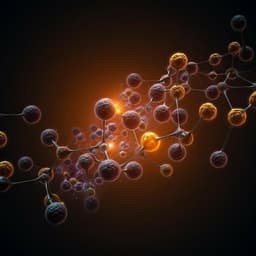
Medicine and Health
Rational optimization of a transcription factor activation domain inhibitor
S. Basu, P. Martínez-cristóbal, et al.
Transcription factors, often deemed 'undruggable', are now in the spotlight for their potential as therapeutic targets. This groundbreaking research, conducted by authors including Shaon Basu and Paula Martínez-Cristóbal, reveals that the aromatic character of the androgen receptor's activation domain is key to its activity. By optimizing a small-molecule inhibitor, EPI-001, the team demonstrated its ability to inhibit androgen-receptor-dependent transcription and exhibit promising antitumorigenic effects. This study opens up new avenues for drug development in treating cancers like castration-resistant prostate cancer.
Related Publications
Explore these studies to deepen your understanding of the subject.







